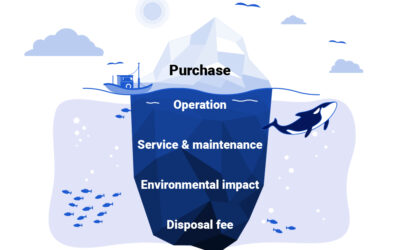Earth Overshoot Day 2024 will be on August 1st.
This date marks the point at which humanity’s demand for ecological resources and services in a given year exceeds what the Earth can regenerate in that year.
In practice, from August 1st onwards, we live on borrowed resources for the rest of the year.
The Global Footprint Network calculates this date each year by comparing the planet’s biocapacity (the amount of natural resources the Earth can generate) with humanity’s ecological footprint (the demand for those resources).
By 2024, the calculation revealed that humanity is using resources faster than the planet can renew them, highlighting current problems of environmental sustainability and resource management.
Earth Overshoot Day is announced every June 5 , on the occasion of World Environment Day .
This year’s Earth Overshoot Day is especially significant because it falls during the Olympics, a time of global unity and human potential.
This juxtaposition highlights the critical challenge humanity faces in reducing overexploitation and achieving a sustainable lifestyle.
What is Earth Overshoot Day?
Earth Overshoot Day is a symbolic date that marks the moment when humanity has consumed all the natural resources that the planet is able to regenerate in a year. Every year, the Global Footprint Network calculates this date to highlight the point of no return in our ecological consumption. In 2024, indicating that we are using the Earth’s resources at an unsustainable rate.
Because it is important?
Earth Overshoot Day is a crucial indicator of the health of our planet. If we continue to consume natural resources at a rate that exceeds their regeneration capacity, we are compromising the Earth’s ability to support future generations. Each year, this date tends to move closer to the start of the year, an alarming signal that requires urgent action.

Considering the amount of raw materials per capita globally, the “debt” of a country could theoretically be compensated by the “credit” accumulated by more virtuous countries, which are not in overshoot. However, today, the consumption of some countries far exceeds what nature is able to provide us.
In 2024, our species has consumed resources as if it had 1.72 Earths at its disposal.
Could Mars help us?
Considering the consumption and depletion of global resources, it becomes clear that we must learn to sustainably manage Earth’s resources if we are serious about exploring and colonizing Mars.

Just because we have another planet at our disposal does not mean we can continue to consume beyond Earth’s sustainable limits.
Instead, we should learn from the challenges we face here on Earth to develop technologies, practices, and policies that enable us to live in harmony with the limited resources of any planet.
The Causes of Overshoot
The overexploitation of natural resources is due to a combination of factors:
- Excessive Energy Consumption : The intensive use of fossil fuels and the increased demand for energy by industries and households.
- Deforestation : The destruction of forests to make way for agriculture and urbanization reduces the Earth’s capacity to absorb carbon dioxide.
- Exploitation of the Seas : Overfishing and marine pollution are depleting the oceans.
- Population Growth : Population growth increases the demand for natural resources, food, water, and living space.
- Intensive Agriculture : Unsustainable farming practices deplete soil and reduce biodiversity.
The consequences
The consequences of exceeding the ecological limit are numerous and interconnected:
- Climate Change : Increasing greenhouse gas emissions cause extreme weather events and global warming.
- Loss of Biodiversity : The extinction of animal and plant species threatens ecosystems and the services they provide.
- Land Degradation : The loss of fertile soil reduces the ability to produce food.
- Water Stress : Water scarcity affects billions of people, exacerbating geopolitical tensions.
Past dates
To better understand the evolution of Earth Overshoot Day over the decades, it is useful to examine how the date has shifted in recent years.
Global Footprint Network has reconstructed the dates for some of these past years:
- 2023 : August 2
- 2022 : July 28
- 2021 : July 29
- 2020 : August 22nd
- 2019 : July 29
- 2018 : August 1st
- 2017 : August 2
- 2016 : August 8
- 2015 : August 13
- 2014 : August 19
- 2013 : August 20
- 2012 : August 22
- 2011 : September 27
- 2010 : August 21
- 2004 : October 10
- 1994 : Early October
- 1984 : Early November
- 1974 : Early December
- 1964 : After the end of December

In 2020, it was delayed compared to previous years due to the COVID-19 pandemic and the resulting reductions in economic activity and emissions.
What can we do?
Reversing this trend requires collective commitment and concrete actions at different levels:
- Reduce Energy Consumption : Adopt renewable energy sources, improve energy efficiency and reduce waste.
- Promote Sustainability : Support sustainable agricultural practices, protect forests and preserve marine ecosystems.
- Reduce Waste : Promote recycling, reuse and reduction of food waste.
- Raise Awareness and Educate : Inform the public about the importance of sustainability and encourage green behavior.
- Environmental Policies : Support laws and regulations that protect the environment and encourage responsible use of resources.
In 1969, Earth Day was created with the intent of educating and informing. Today, it has become an event of international significance, celebrated annually on April 22.
Conclusion
For more details on Earth Overshoot Day and the methodology behind its calculation, you can visit the Global Footprint Network website .
Earth Overshoot Day 2024 reminds us once again of the urgency of changing our relationship with the planet.
Every day that passes beyond this date represents an ecological debt that we are leaving to future generations.
It is our duty to act now, adopting more sustainable lifestyles and promoting policies that protect and regenerate the Earth’s natural resources.
Only through a concerted global effort can we hope to move back Earth Overshoot Day and ensure a sustainable future for all.




